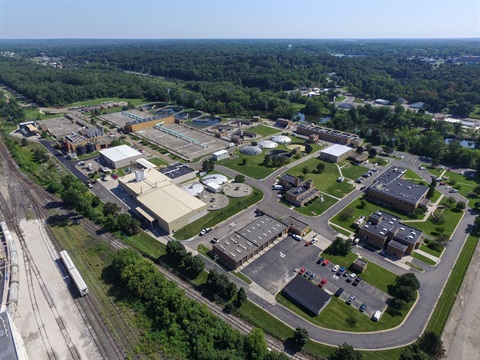2026 CWSRF Biosolids Management & Wastewater Infrastructure Projects

The City of Kalamazoo is committed to maintaining a safe, reliable, and environmentally responsible wastewater system. To address key infrastructure challenges and plan for the future, the City is seeking Clean Water State Revolving Fund (CWSRF) funding for several critical projects. These projects will enhance sewer reliability, improve biosolids management, and protect our natural environment. Full details on each project are available in the project plan.
Project A1 – Dryer and Energy Recovery System (ERS)
Why It’s Needed:
Kalamazoo’s wastewater treatment process generates biosolids that are currently disposed of in landfills, but increasing costs and regulatory uncertainties make this approach unsustainable. In addition, contaminants of emerging concern (CECs), such as PFAS, limit disposal options and present environmental risks.
What This Project Will Do:
This project will upgrade the City’s biosolids management system with advanced drying and thermal oxidation technology. The improvements will:
- Reduce biosolids volume by up to 93% through drying and thermal processing.
- Lower disposal costs and energy use with a system that captures and reuses heat.
- Address contaminants like PFAS by providing high-temperature treatment options.
- Improve regional biosolids management by allowing the City to assist neighboring communities facing similar challenges.
By investing in this system, Kalamazoo will secure a more sustainable and cost-effective biosolids management strategy for the future.
Project A2 – Dryer Only Facility
Why It’s Needed:
Like Project A1, this project aims to reduce biosolids disposal costs by removing excess moisture and making the material easier to handle. However, it does not include the additional energy recovery or contaminant treatment capabilities of Project A1.
What This Project Will Do:
- Install biosolids dryers to achieve up to 70% volume reduction.
- Reduce transportation and landfill disposal costs.
- Improve biosolids storage and handling efficiency.
While this project provides cost savings in the short term, it does not address contaminants such as PFAS, which could lead to future regulatory and financial challenges.
Project B1 – Replacement of 6-inch Sanitary Sewer at Farmers Alley
Why It’s Needed:
The existing 6-inch sewer at Farmers Alley, installed in 1882, is undersized and has experienced failures, backups, and structural deterioration. Previous rehabilitation attempts were unsuccessful due to outdated infrastructure constraints.
What This Project Will Do:
- Replace approximately 70 feet of aging 6-inch sewer with a modern 8-inch pipe.
- Improve sewer capacity and reliability to prevent backups.
- Reduce service disruptions for downtown businesses and property owners.
- Coordinate with other utility upgrades to ensure long-term system efficiency.
This project will help maintain a reliable sewer system for downtown Kalamazoo while reducing the risk of future failures.
Project C1 – Kleinstuck Preserve SSOs
Why It’s Needed:
The Kleinstuck Preserve has experienced sanitary sewer overflows (SSOs) due to aging infrastructure, root intrusion, and structural defects. These overflows pose environmental risks to this sensitive natural area.
What This Project Will Do:
- Rehabilitate sewer pipes and manholes to prevent future overflows.
- Address localized pipe sags, backfall, and structural weaknesses.
- Construct a 12-foot-wide aggregate path to improve maintenance access while minimizing environmental disruption.
This project provides a long-term solution to protect the Kleinstuck Preserve and ensure the reliability of the local sewer system.
The City of Kalamazoo is dedicated to making responsible, forward-thinking investments in our wastewater infrastructure. These projects will enhance system reliability, protect public health and the environment, and help manage costs for our community. For more details, please refer to the full project plan.
View Full Details in the 2026 CWSRF Project Plan(PDF, 43MB)
Learn more about the Biosolids Management Aspect of this Project in a video from Public Media Network
The CWSRF Program is administered by the Michigan Department of Environment, Great Lakes, and Energy with the purpose of protecting and improving water quality. The proposed project will address structural, electrical, and capacity issues in the existing wastewater collection system and improve system operations by replacing existing infrastructure and equipment.
The estimated cost to users for the proposed project will be: $196,829,913.00.